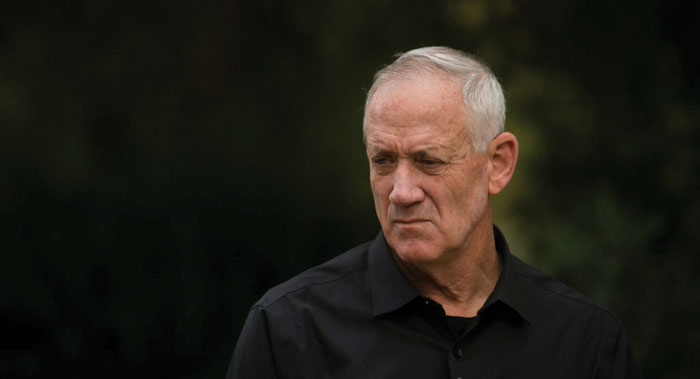 Benny Gantz meets with the press on Oct. 29, 2023 in Ramot Naftali, Israel in the wake of the Oct. 7 attacks.
(Photo by Amir Levy/Getty Images)
Benny Gantz meets with the press on Oct. 29, 2023 in Ramot Naftali, Israel in the wake of the Oct. 7 attacks.
(Photo by Amir Levy/Getty Images) This week may well be the most dangerous week in the war so far. Dangerous — not as in the horrors of massacre, or the agony of the battlefield, not because of an exceptional number of dead and wounded. This is perhaps the most dangerous week in the war so far in a strategic sense. This is dangerous in everything that concerns Israel’s ability to overcome the crisis, to win the war, and to avoid an unbearable internal crisis.
This is a dangerous week in everything that concerns Israel’s ability to overcome the crisis, to win the war, and to avoid an unbearable internal crisis.
Let’s map the reasons for the danger:
Israel has a government that the majority of the people do not trust. But it is a legitimate, legally elected government, with a mandate to continue ruling. Theoretically, it can rule for a long time (more than two years), even though a clear majority of the public (around 70%) support an early election.
The untrustworthy government is waging a war for which almost all Israelis are paying a price, including all those who do not support it. In other words, many Israelis are required to bear the burden of a war that is being led by a people they do not trust.
The share of Israelis in such situation is about to increase because of the expected decision by Benny Gantz and the Mamlachti Camp Party to leave the government. Gantz chose to convey his “I-can-no-longer-stay” as an ultimatum — he’d quit only after three weeks of waiting for the PM to respond to a list of his demands. But Netanyahu didn’t even bother to pretend to be considerate of the warning. He promptly rejected Gantz’ demands, which means that if Gantz intends to actually wait the three weeks, he is wasting his time and ours.
Also this week, the summer session of the Knesset was opened, which foreshadows two things: This is the only window of time in which the parliament can vote to have early elections in the coming months; also, this is the window of time in which the government intends to pass a law exempting the ultra-Orthodox from military service. The two things will be a fuse that generates protests and a heated debate.
That is, in the midst of a war that Israel is not close to winning, the country is likely to engage in a persistent, bitter and difficult social and political battle. Obviously, this is a dangerous situation. Obviously, it would have been better to avoid it.
The rift that I described here is probably inevitable. There will be a government with a majority in the Knesset and lacking in public trust that is going to lead Israel at war. There will be a government with legal legitimacy but without broad civilian legitimacy that is going to lead Israel at war. And it doesn’t matter much if you think that this situation is the fault of Netanyahu, or Gantz, or the protesters. This is where we are, and we will all pay a price for it, because damage to the country’s security, to its international status, to its ability to defend itself, to its resources, to its economic robustness — these will come at the expense of all of us.
This is where we are, which means that every move of the government will be viewed with suspicion, and that every decision will be more difficult to implement. Which also means that the government will not have a broad international backing. Which also means that the tone will become harsher: The government and its supporters will blame their political opponents for the failure of the war effort. Opponents of the government will say that with this government it is impossible to win.
Is it possible to avoid this dangerous and destructive situation? The answer I can offer will anger those who still support the government. But this, in my opinion, is the only plausible option: Netanyahu, or some members of his coalition, should announce that they understand that the situation calls for elections, and set a date for as soon as possible. Then the government will continue to wage the war as it sees fit, until a new government is implemented. Hopefully, one based on a broad coalition.
The likelihood that this possibility will be realized seems currently low, but this could change if and when it becomes clear that the government is having trouble running the country, and the spiral towards possible defeat continues. And one must admit: an election would not be a good way out of a bad situation. It would be, at best, a slightly less bad way than the other way — that is, less bad than a government that insists on waging the war without the public’s trust.
Coalition supporters will argue, not without reason, that this proposal is a gift to Israelis who refuse to accept the legitimacy of a government with which they ideologically disagree. The opposition will argue, not without reason, that the root of the tragedy is the promiscuous conduct of a government that made a deliberate effort to antagonize half of the public. Either way, the troubling news is that it’s no longer possible to prevent a dangerous stage of social turmoil during a war. The only thing that Israelis can still do is try to make it shorter.
Something I wrote in Hebrew
When Defense Minister Yoav Gallant publicly implied that PM Netanyahu’s position on “the day after” in Gaza is based on political reasons, I wrote this:
Gallant has a claim: We need to talk about the day after, and we need to announce right now that there will be no prolonged military rule over Gaza. Netanyahu has a counterargument: There is no need to talk about the day after, and any proposal that could possibly mean control by the Palestinian Authority in Gaza should be rejected. These are substantive claims, and they must be discussed on their own, regardless of the question of the motives of those who express them. Sometimes, even a nonkosher motive produces a valid claim.
A week’s numbers
A majority of the Jewish public (and essentially all Arabs) are ready for new election, but the coalition has a 64-seat majority to prevent it.

A reader’s response:
Ella Azulay asks: “Do you think Israel was involved in what happened in Iran?”Answer: Assuming you refer to the helicopter crash – no. Sometimes bad weather is just bad weather.
Shmuel Rosner is senior political editor. For more analysis of Israeli and international politics, visit Rosner’s Domain at jewishjournal.com/rosnersdomain.






















 More news and opinions than at a Shabbat dinner, right in your inbox.
More news and opinions than at a Shabbat dinner, right in your inbox.